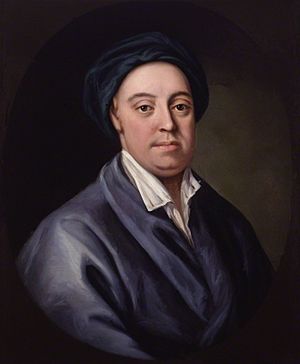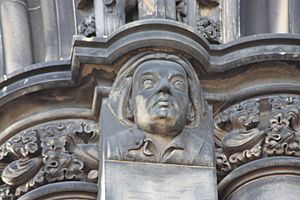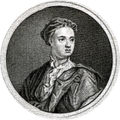James Thomson (poet, born 1700) facts for kids
Quick facts for kids
James Thomson
|
|
|---|---|
 |
|
| Born | c. 11 September 1700 Ednam, Roxburghshire, Kingdom of Scotland |
| Died | August 27, 1748 (aged 47) Richmond upon Thames, Kingdom of Great Britain |
| Alma mater | University of Edinburgh |
James Thomson (born around September 11, 1700, died August 27, 1748) was a famous British poet and writer of plays. He is best known for his long poems called The Seasons and The Castle of Indolence. He also wrote the words for the well-known song "Rule, Britannia!".
Contents
Early Life in Scotland (1700–1725)
James Thomson was born in a place called Ednam in Scotland. This was around September 11, 1700. He was one of nine children. His father, Thomas Thomson, was a Presbyterian minister, which is a type of church leader. When James was very young, his family moved to Southdean, where he spent most of his childhood.
School Days and First Poems
James probably went to the local school in Southdean. Later, he attended the grammar school in Jedburgh in 1712. He wasn't known for being a brilliant student there. However, two people encouraged him to write poetry: Robert Riccaltoun, a farmer and minister, and Sir William Bennet, a wealthy landowner who supported writers.
James wrote many early poems, but he used to burn most of them every New Year's Day!
University and Moving to London
In 1715, Thomson started studying at the College of Edinburgh. He was planning to become a Presbyterian minister, like his father. He studied many subjects, including Greek, Latin, and science. His father died in 1716.
At Edinburgh, James joined a writing group called the Grotesque Club. Here, he met his good friend David Mallet. After some of his poems were published in a collection called the "Edinburgh Miscellany," Thomson decided to move to London. He went there in February 1725, hoping to publish more of his poems.
Life in London (1725–1727)
When Thomson arrived in London, he found a job as a tutor for the son of Charles Hamilton, Lord Binning. This job came through his mother's family connections. His friend David Mallet was already a published poet. Through Mallet, Thomson met other famous English poets like Alexander Pope.
The Seasons: Winter
In May 1725, Thomson's mother passed away. Around this time, he was writing "Winter," which was the first poem in his famous series called The Seasons. "Winter" was published in 1726. A second edition came out later that year with some changes and a special introduction.
By 1727, Thomson was working on "Summer," which was published in February. He also worked at Watt's Academy, a school for young gentlemen that focused on science. That same year, he published a poem about the famous scientist Isaac Newton, who had just died. Thomson left Watt's Academy, hoping to make a living just from his poetry. He was lucky to find several rich people who supported him, including Thomas Rundle and the Countess of Hertford.
Later Life and Famous Works (1728–1748)
Thomson continued to write the other parts of The Seasons. He wrote "Spring" in 1728 and "Autumn" in 1730. All four poems were then published together as The Seasons. During this time, he also wrote his first play, Sophonisba (1730). This play is famous because of a funny story: one line, "O, Sophonisba, Sophonisba, O!" was so weak that people in the theater made fun of it by saying, "O, Jemmy Thomson, Jemmy Thomson, O!"
Traveling and New Opportunities
In 1730, Thomson became a tutor for the son of Sir Charles Talbot, a very important lawyer. Thomson traveled around Europe with the young man for almost two years. When they returned, Talbot helped Thomson get a job as a secretary in the Court of Chancery, which was a type of court. This job gave him money and security until Talbot died in 1737.
His next big work was Liberty (1734). This long poem is like a speech from the "Goddess of Liberty." She talks about her journeys through ancient times and British history, ending with the Glorious Revolution of 1688, which brought more freedom to Britain.
Rule, Britannia!
In 1740, Thomson worked with his friend Mallet on a play with music called Alfred. It was performed at Cliveden, the home of Frederick, Prince of Wales. Thomson wrote the words for the song "Rule Britannia" for this play. The music was written by Thomas Arne. This song became one of the most famous British patriotic songs, even though the play itself is mostly forgotten today. The Prince of Wales was so pleased that he gave Thomson a yearly payment.
Final Years and Legacy
In his later years, Thomson lived in Richmond upon Thames. There, he wrote his last major work, The Castle of Indolence. This poem was published just before he died on August 27, 1748. He caught a cold while traveling on the water, which led to a fever that ended his life. He is buried in St. Mary Magdalene church in Richmond.
Thomson's poem The Seasons was so popular that it was translated into German. This German version was later used as the words for a famous musical piece called an oratorio, also named The Seasons, by the composer Joseph Haydn.
Memorials and Tributes
James Thomson is one of sixteen Scottish poets and writers honored on the Scott Monument in Edinburgh. You can see his image on the right side of the east face of the monument.
He also has a large memorial in Westminster Abbey's Poets' Corner, a special place where famous writers are remembered. His memorial is next to William Shakespeare's and below that of another Scottish poet, Robert Burns.
In Richmond Park's Pembroke Lodge Gardens, there is a special place for Thomson. A bench, called "Poet's seat," has lines from his poems carved into it. There is also a wooden plaque with a poem written about Thomson by a historian named John Heneage Jesse.
Another spot in Richmond Park, called King Henry's Mound, has a seat with lines from Thomson's poem "The Seasons" carved into it.
Images for kids
-
James Thomson, from Samuel Johnson's Lives of the English Poets (around 1779)
-
The front page of The Seasons by James Thomson. Published by Alexander Donaldson.
See also
 In Spanish: James Thomson (poeta escocés) para niños
In Spanish: James Thomson (poeta escocés) para niños
 | May Edward Chinn |
 | Rebecca Cole |
 | Alexa Canady |
 | Dorothy Lavinia Brown |




